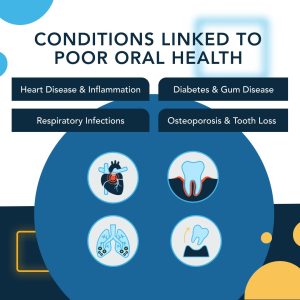Oral health is about more than just a bright smile. The health of your teeth and gums is closely connected to your overall well-being. In fact, research shows that issues in the mouth can be linked to conditions like heart disease, diabetes, and even respiratory infections. Sometimes, your mouth can be one of the first places to show signs of other health problems. In this article, we’ll look at how caring for your oral health can help support a healthier body.
What Is the Oral-Systemic Health Connection?
The oral-systemic health connection refers to the relationship between oral health and the health of the rest of the body. Bacteria in the mouth can enter the bloodstream and contribute to inflammation and infection in other areas. Poor oral hygiene has been linked to a range of systemic conditions, including heart disease, diabetes, and respiratory illness. Understanding this connection highlights the importance of maintaining good oral health as part of overall wellness.
Conditions Linked to Poor Oral Health
Poor oral health can do more than cause cavities or gum disease. Research has shown that infections and inflammation in the mouth may contribute to serious health problems throughout the body. When bacteria from the mouth enter the bloodstream, they can affect major organs and systems. Below are several medical conditions that have been linked to inadequate oral care.
Heart Disease and Inflammation
Chronic gum inflammation caused by periodontal disease has been associated with an increased risk of heart disease. Bacteria from the mouth can enter the bloodstream, causing inflammation in the blood vessels and contributing to plaque buildup in the arteries. This may lead to conditions such as high blood pressure, heart attack, or stroke. Maintaining healthy gums may help reduce the risk of cardiovascular problems.
Diabetes and Gum Disease
The relationship between diabetes and gum disease goes both ways. People with diabetes are more likely to develop gum infections, and untreated gum disease can make it harder to control blood sugar levels. Inflammation in the gums can interfere with the body’s ability to use insulin effectively. Managing oral health is especially important for individuals with diabetes to help support better overall health outcomes.
Respiratory Infections
Poor oral hygiene can contribute to respiratory issues, particularly in older adults or those with weakened immune systems. Bacteria from the mouth can be inhaled into the lungs, increasing the risk of infections such as pneumonia or worsening existing conditions like chronic obstructive pulmonary disease (COPD). Regular brushing, flossing, and professional cleanings can help reduce the risk of these complications.
Pregnancy Complications
Pregnant individuals with untreated gum disease may be at higher risk for complications such as preterm birth or low birth weight. Inflammation and bacteria in the mouth can affect the placenta and other pregnancy-related systems. Maintaining good oral hygiene and attending regular dental checkups during pregnancy is an important part of prenatal care.
Osteoporosis and Tooth Loss
Osteoporosis, a condition that weakens bones, can also affect the jawbone and lead to tooth loss. If the bone that supports the teeth becomes less dense, teeth may loosen or fall out. Some medications used to treat osteoporosis may also impact oral health. Regular dental care, along with bone health monitoring, can help identify and manage risks early on.
Signs Your Oral Health May Be Affecting Your Body
Oral health issues do not always stay confined to the mouth. In many cases, the body shows subtle signs that something more serious may be happening beneath the surface. Recognizing these early warning signs can help you take action before small oral health problems contribute to larger systemic concerns. Below are some symptoms that may indicate a deeper connection between your oral health and overall well-being.
 Chronic Bad Breath
Chronic Bad Breath
Persistent bad breath that does not improve with brushng, flossing, or mouthwash may be more than just a hygiene issue. It can be a sign of ongoing gum disease or infection, which may also signal underlying inflammation in the body. If bad breath becomes constant, it is worth discussing with your dentist, as it could indicate a more serious condition.
Gum Bleeding
Gums that bleed during brushing or flossing are often a sign of gingivitis, an early stage of gum disease. However, frequent or excessive bleeding may also reflect poor immune response or inflammation that affects the entire body. Addressing bleeding gums promptly can prevent progression to more serious conditions and support better systemic health.
Frequent Infections or Slow Healing
If you experience recurring mouth sores, infections, or find that cuts and wounds in the mouth heal slowly, this could point to a compromised immune system. These signs are sometimes linked to conditions like diabetes or nutritional deficiencies. Your dentist can help identify potential causes and recommend next steps for further evaluation or treatment.
Fatigue, Inflammation, or Pain Without Clear Cause
Unexplained fatigue or discomfort, especially when paired with gum inflammation or tooth pain, may be your body’s way of signaling a hidden problem. Chronic oral infections can contribute to ongoing inflammation, which may strain the body and lead to symptoms that affect your energy levels, focus, or overall quality of life. Listening to these signals and seeking dental care can help uncover and address the root cause.
Preventive Dental Care and Whole-Body Wellness
Preventive dental care is one of the most effective ways to protect both your oral and overall health. By staying proactive with your dental routine and maintaining regular checkups, you reduce the risk of developing infections, inflammation, and other conditions that can impact the entire body. Small daily habits, paired with professional care, can make a lasting difference in your long-term well-being.
Importance of Regular Dental Checkups
Routine dental visits allow your dentist to monitor your oral health and detect problems before they become serious. Professional cleanings remove plaque and tartar that brushing alone cannot reach, while exams can identify early signs of gum disease, oral cancer, or other concerns. Regular checkups also give your dentist the chance to assess how oral health may be affecting your overall condition and recommend any necessary follow-up care.
Daily Oral Hygiene Habits
Brushing twice a day and flossing daily form the foundation of good oral hygiene. These simple practices help prevent the buildup of plaque, reduce inflammation, and keep harmful bacteria in check. Consistency is key, as cleaning your teeth thoroughly every day supports your immune system and helps reduce the risk of health issues linked to poor oral care.
Nutrition for Healthy Teeth and Gums
A balanced diet plays a critical role in maintaining oral and systemic health. Nutrients like calcium, vitamin D, and vitamin C support strong teeth, healthy gums, and proper immune function. Limiting sugary foods and drinks also helps prevent decay and gum disease. Staying hydrated and choosing whole, nutrient-rich foods can benefit both your smile and your overall health.
When to Talk to Your Dentist About Health Concerns
Your dentist may notice signs of systemic issues during a routine exam, but it’s also important for you to share any health changes or concerns. If you have a chronic condition like diabetes or heart disease, let your dentist know. Open communication allows your dental provider to tailor care to your needs and may help identify connections between oral symptoms and broader health issues.
How Your Dentist Can Help Detect Early Signs of Systemic Illness
Your dentist plays an important role in more than just keeping your teeth clean. During a routine dental exam, your provider may be the first to notice subtle signs that point to underlying health issues elsewhere in the body. Because many systemic conditions first present symptoms in the mouth, regular dental visits can serve as an early warning system and prompt timely medical follow-up.
Gum Changes That May Signal Diabetes
Swollen, tender, or frequently bleeding gums can be more than signs of gum disease, as they may also indicate diabetes. People with diabetes are more susceptible to infections and may have a harder time healing, which often shows up first in the gums. If your dentist sees persistent inflammation or notices signs of poor healing, they may recommend checking your blood sugar levels or following up with your physician.
Oral Lesions and Signs of Immune Disorders
Certain autoimmune or immune-related conditions can cause unusual sores, white patches, or chronic ulcers in the mouth. Conditions like lupus, HIV, and other immune disorders often present early symptoms in the oral tissues. If your dentist observes recurring or unexplained lesions, they may suggest a medical evaluation to rule out or identify systemic causes.
Jaw and Bone Changes Linked to Osteoporosis
Dentists can detect changes in jawbone density during X-rays or routine exams that may point to early bone loss. If the bone supporting your teeth appears weakened or if teeth begin to loosen without clear cause, it could be a sign of osteoporosis. Identifying these changes early allows for timely referral to a physician for bone health assessment and management.
Signs of Nutritional Deficiencies in the Mouth
Deficiencies in key vitamins and minerals often show up first in the mouth. A swollen or smooth tongue, pale gums, cracked lips, or frequent mouth sores can indicate issues like low iron, vitamin B12 deficiency, or insufficient vitamin C. Your dentist can help identify these warning signs and suggest further evaluation or dietary changes to support both oral and systemic health.
Dry Mouth and Medication Side Effects
Chronic dry mouth may be more than a minor inconvenience. It is often caused by medications used to treat conditions such as high blood pressure, depression, or allergies. Dry mouth can increase the risk of tooth decay and gum disease while also pointing to possible imbalances in your overall health. If you’re experiencing persistent dryness, your dentist can help determine the cause and recommend solutions to protect your oral health.
Schedule an Appointment with a Davie Dentist
Your oral health plays a vital role in your overall well-being, and choosing the right dental provider can make all the difference. If you are looking for a trusted Davie dentist, our team is here to help you take the next step toward better health. Whether you’re searching for a dentist near me or need comprehensive care from a dentist in Davie, Florida, we proudly serve families throughout Broward County. Contact us today to schedule your next appointment!
August 8, 2025

 Adult
Adult



 Chronic Bad Breath
Chronic Bad Breath